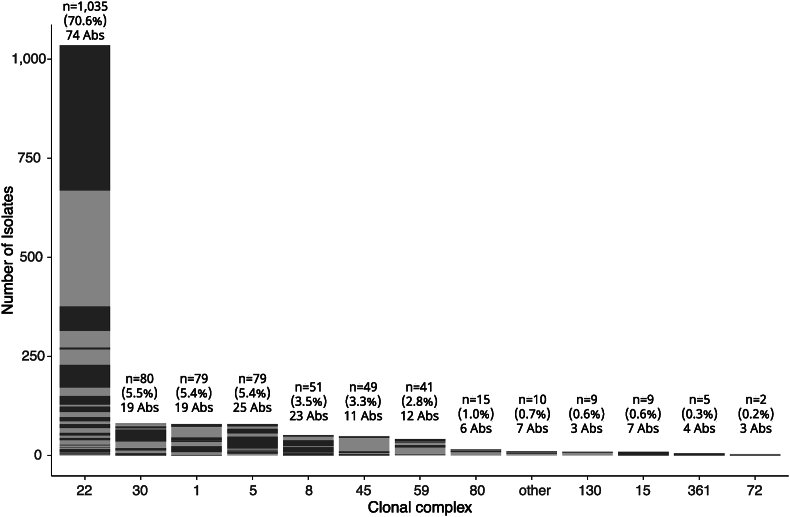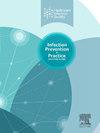Genomic evaluation of phenotypic antibiotic susceptibility patterns as a surrogate for MRSA relatedness and putative transmission during outbreak investigations
IF 1.9
Q3 INFECTIOUS DISEASES
引用次数: 0
Abstract
Antibiograms have been used during outbreak investigations for decades as a surrogate for genetic relatedness of Methicillin-resistant Staphylococcus aureus (MRSA). In this study, we evaluate the accuracy of antibiograms in detecting transmission, using genomic epidemiology as the reference standard. We analysed epidemiological and genomic data from 1,465 patients and 1,465 MRSA isolates collected at a single clinical microbiology laboratory in the United Kingdom over a one-year period. A total of 132 unique antibiograms (AB) were identified based on VITEK 2 susceptibility testing, with two profiles (AB1 and AB2) accounting for 698 isolates (48%). We identified MRSA-positive patients with a known hospital or community contact and evaluated the prediction of MRSA transmission based on identical antibiograms. The sensitivity and specificity of identical antibiograms to infer genetically related MRSA isolates (≤25 SNPs) within hospital contacts (presumed transmission events) was 66.4% and 85.5% respectively and 73.8% and 85.7% within community contacts. Reanalysis, where any single drug mismatch in susceptibility results was allowed, increased sensitivity but reduced specificity: 95.2% and 58.8%, respectively, for hospital contacts; and 91.7% and 62.6% for community contacts. Overall, the sensitivity and specificity of identical antibiograms for inferring genetically related MRSA isolates (≤25 SNPs), regardless of epidemiological links, were 49.1% and 87.5%, respectively. We conclude that using an antibiogram with one mismatch can detect most transmission events; however, its poor specificity may lead to an increased workload through the evaluation of numerous pseudo-outbreaks. This study further supports the integration of genomic epidemiology into routine practice for the detection and control of MRSA transmission.

在疫情调查期间,表型抗生素敏感性模式的基因组评估作为MRSA相关性和推定传播的替代品。
几十年来,抗生素谱在疫情调查中被用作耐甲氧西林金黄色葡萄球菌(MRSA)遗传相关性的替代方法。本研究以基因组流行病学为参考标准,评价抗生素谱检测传播的准确性。我们分析了在英国一个临床微生物实验室收集的1465名患者和1465株MRSA分离株的流行病学和基因组数据,为期一年。VITEK 2药敏试验共鉴定出132个独特抗生素谱(AB),其中AB1和AB2两个谱占698株(48%)。我们确定了与已知医院或社区接触的MRSA阳性患者,并根据相同的抗生素图评估了MRSA传播的预测。在医院接触者(假定的传播事件)中,相同抗生素谱推断遗传相关MRSA分离株(≤25个snp)的敏感性和特异性分别为66.4%和85.5%,在社区接触者中分别为73.8%和85.7%。在允许药敏结果中存在任何单一药物不匹配的情况下,再分析增加了敏感性,但降低了特异性:对医院接触者分别为95.2%和58.8%;社区接触者分别为91.7%和62.6%。总体而言,在不考虑流行病学联系的情况下,相同抗生素谱推断遗传相关MRSA分离株(≤25个snp)的敏感性和特异性分别为49.1%和87.5%。我们的结论是,使用一个不匹配的抗生素谱可以检测到大多数传播事件;然而,由于其特异性较差,可能会通过对许多伪疫情的评估导致工作量增加。本研究进一步支持将基因组流行病学纳入MRSA传播检测和控制的常规实践。
本文章由计算机程序翻译,如有差异,请以英文原文为准。
求助全文
约1分钟内获得全文
求助全文
来源期刊

Infection Prevention in Practice
Medicine-Public Health, Environmental and Occupational Health
CiteScore
4.80
自引率
0.00%
发文量
58
审稿时长
61 days
 求助内容:
求助内容: 应助结果提醒方式:
应助结果提醒方式:


